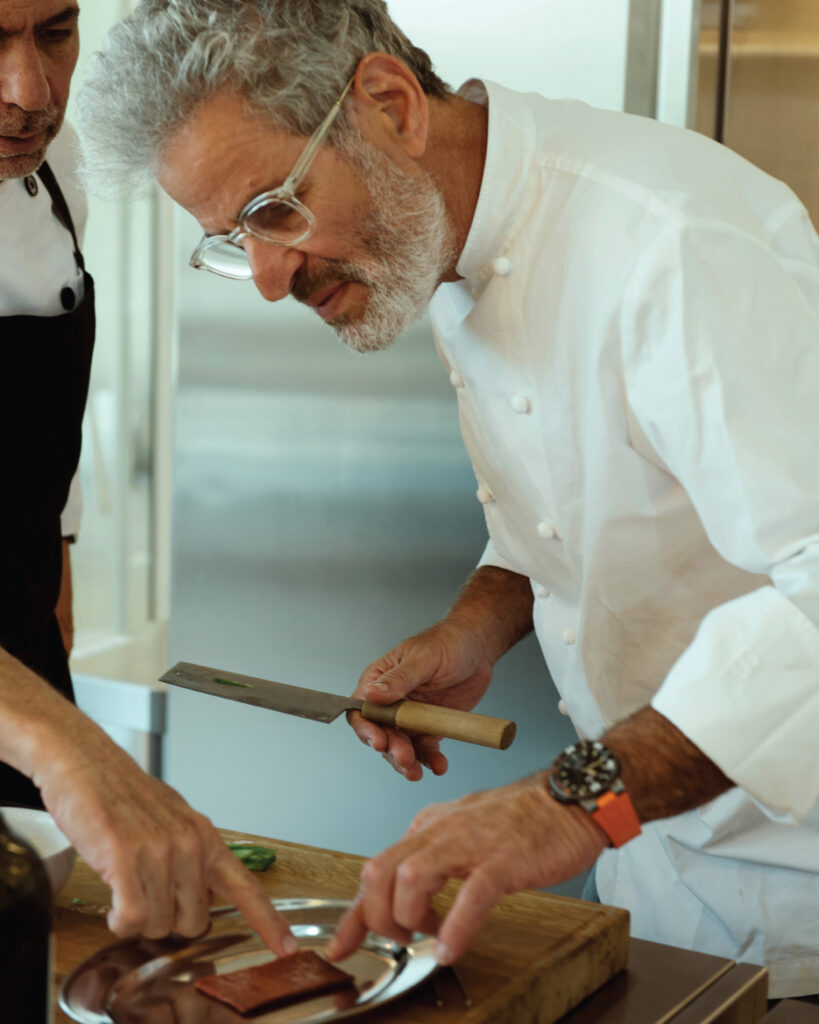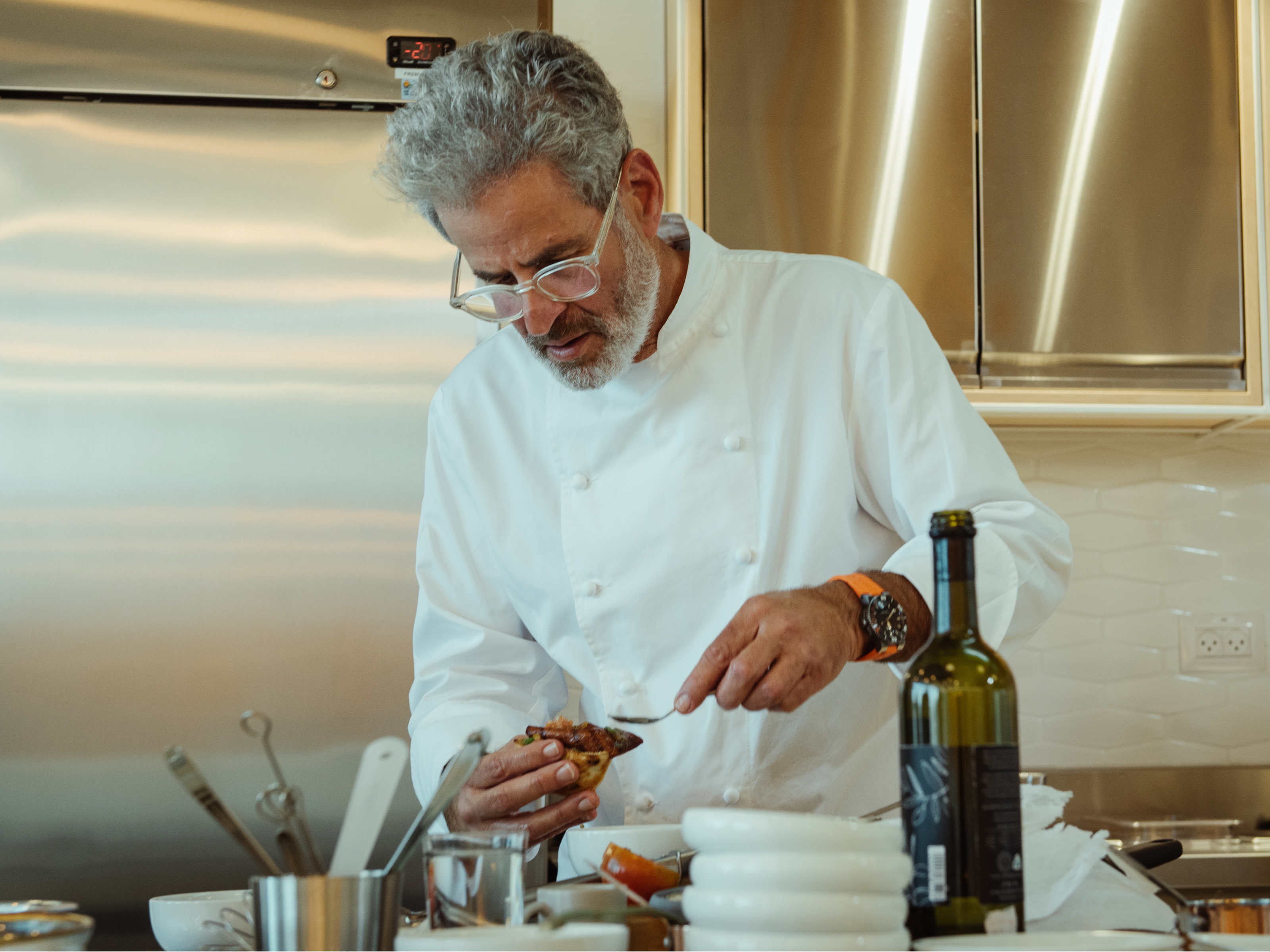Aleph Farms Teams Up with Miznon Chef Eyal Shani to Roll Out Cultivated Steak in Restaurants
5 Mins Read
Israeli cultivated meat pioneer Aleph Farms is gearing up for the restaurant launch of its beef steaks through a partnership with Michelin-starred chef Eyal Shani.
At the tail-end of last year, Aleph Farms became the third company to receive regulatory approval for cultivated meat anywhere in the world, with Israel clearing its Black Angus Petit Steak for sale in the country.
Now, nine months on, the launch of the product – under its Aleph Cuts line – is closer than ever, thanks to a collaboration with Eyal Shani, the celebrity chef behind the restaurant chain Miznon.
“Together with Eyal Shani, we will debut Aleph Cuts through a series of thoughtfully curated dining experiences in Israel,” an Aleph Farms spokesperson told Green Queen.
Shani is joining the company as an investor and launch partner, helping it introduce its cultivated beef via roaming dining experiences. But it remains to be seen which of Shani’s eateries debuts the product, and when.
“Eyal’s dedication to using the finest ingredients and raw materials elevates our new category of animal products, ensuring that it is not only sustainable but also of exceptional quality,” said Aleph Farms co-founder and CEO Didier Toubia. “His innovative spirit and focus on connecting people through food make him an invaluable partner as we launch Aleph Cuts globally.”
Eyal Shani makes the argument for cultivated meat

A self-proclaimed “re-enchanter” of Israeli cuisine, Shani owns 17 restaurants in Tel Aviv alone, and a total of around 50 globally, from Port Said and Romano to HaSalon. His culinary footprint is spread across the world, including the US, the UK, France, Singapore and Australia. And Shmoné, his New York City eatery, won a Michelin star last year.
“I was born into a vegan family and, until the age of five, was fed only plants and roots. Almost 60 years have passed and today, I have over 50 restaurants across six continents, and I serve meat in all of them. I ask myself constantly: what am I bequeathing to the world?” said Shani.
“Aleph Farms has given me the opportunity to bequeath a future that avoids causing suffering to billions of animals, in which people will be one with nature and not harm it, in which Aleph Cuts are more wonderful than the meat we know today and is so without killing a single animal, and in which our happiness does not require that the animals with which we share the world feel pain,” he added.
The Petit Steak is a hybrid meat product comprising non-modified, non-immortalised cells of a premium Black Angus cow, combined with a plant protein matrix made of soy and wheat. It will be priced similarly to premium beef, the company confirmed.
Before it launches, though, Aleph Farms needs to clear some regulatory hurdles, including the Good Manufacturing Practices assessment for its production plant. “We still need to do the GMP inspection for our pilot facility in Israel and follow the labelling guidelines in Israel before launching with Eyal Shani,” the spokesperson said.
“Before Aleph Cuts become a staple on restaurant menus, it’s important for us to receive feedback from consumers in the initial phase of our launch,” they added. Aleph Farms has previously outlined a long-term goal of making its cultivated beef available in supermarkets.
Aleph Farms in ‘active discussions’ with investors

The partnership with Shani comes months after Aleph Farms laid off 30% of its local employees as part of its “asset-light” approach towards scaling up. “We are maintaining R&D and production in Israel while expanding globally through co-manufacturers,” the firm said at the time. “We care for all affected employees and will be supporting them in the new job search.”
There were suggestions that difficulties in securing fresh capital also played a part in the decision. Aleph Farms has raised $118M in funding so far, with its last round coming in 2022. But the wider fundraising struggles of alternative protein and the geopolitical tension with the Israel-Hamas war have impeded its efforts to secure more money.
“We are in active discussions with potential investors who are aligned with our mission,” the spokesperson said, highlighting that the recent changes have been “challenging” but in line with its “capital-efficient, asset-light scale-up approach”.
“Our primary operational focus is on enhancing robust scale-up capabilities for our production process at our pilot production facility in Israel, as well as in Southeast Asia with our partners – a pivotal region for our hub-and-spoke expansion strategy,” they added.
Aside from its pilot plant in Rehovot, Israel, Aleph Farms has entered a partnership to produce cultivated meat in Thailand, and teamed up with a biotech startup to leverage AI to reduce costs and enable scalability. It has previously also acquired a manufacturing facility in Modi’in, and signed a deal with ESCO Aster in Singapore (the world’s first approved industrial manufacturer for cultivated meat).
The startup has additionally filed for regulatory approval in Singapore, Switzerland, the UK and the US, and is looking to do so in other markets too. “Our team has been advancing our regulatory paths towards launch in various countries while responding to queries and submitting data to authorities worldwide,” the representative said.
Following Israel, the company is planning launches in Singapore and Thailand, before expanding into Japan, South Korea, Hong Kong, China and Australia. “We want to ensure that we first build the right production and sales support capabilities to ensure steady supply over time, and continuous revenue increase for a successful launch of our products.”



